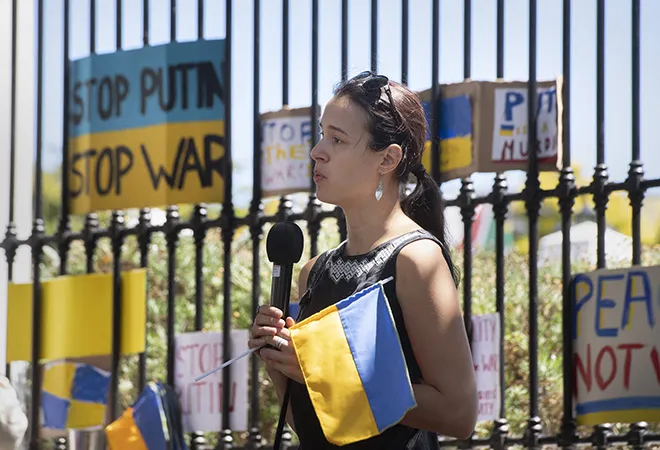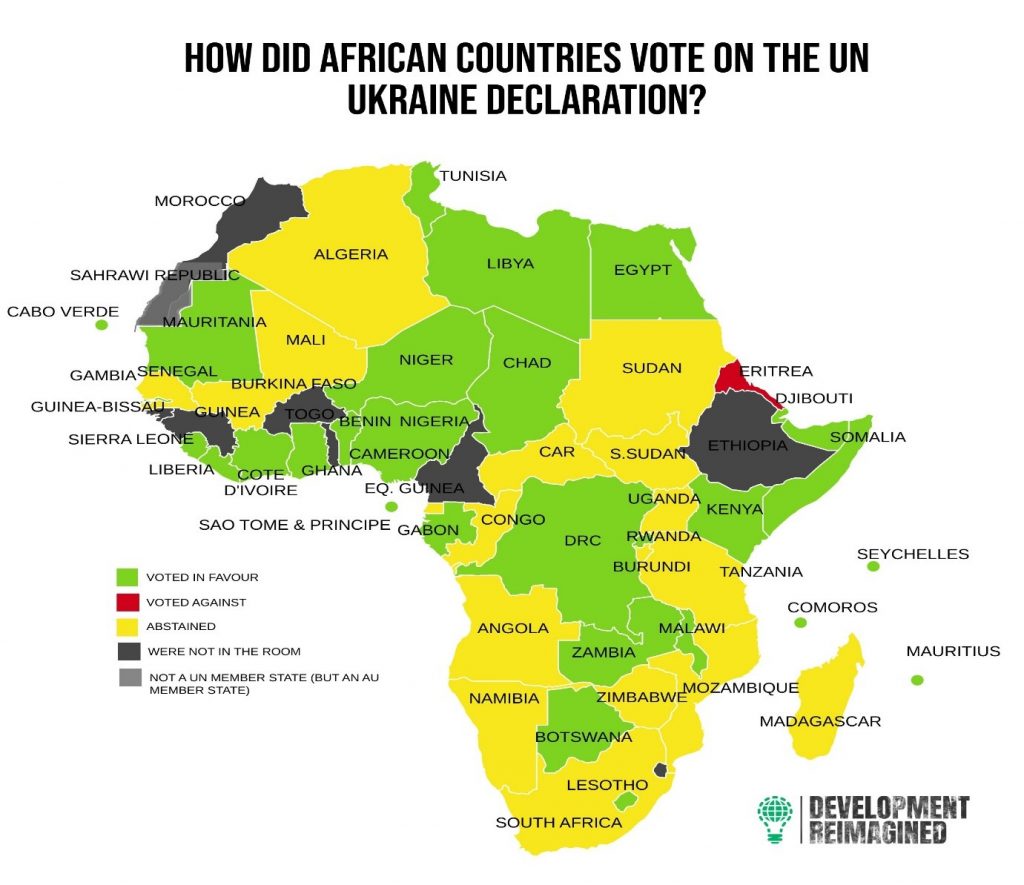-
CENTRES
Progammes & Centres
Location
Equivocal sentiments emanate from African countries on their stance on voting for the UN resolution demanding withdrawal of Russian troops from Ukraine

The Russia invasion of Ukraine has come at a time when countries in Africa are already struggling to recover from the impacts of the pandemic. Despite the war breaking out in a geographically distant region, it still entails several repercussions for the African continent. Given that both Russia and Ukraine play important roles in the continent, this episode is now going to have both immediate and lasting implications for Africa’s economics and politics.
The immediate effect of the war has been felt by African citizens, mostly engineering and medical students, who have reportedly experienced racism and discrimination whilst attempting to flee the besieged country. At least a quarter (around 20 percent) of over 80,000 international students in Ukraine come from African nations, with sizeable populations from Egypt, Nigeria, and Morocco. Various videos have surfaced on social media that showed African citizens being singled out and blocked from boarding trains by security personnel, making space for Ukrainian nationals first.
Both Russia and Ukraine are major suppliers of food commodities such as soya bean, wheat, barley, and sunflower oil to African countries.
The economic impact of the war on Africa has a lot to do with food imports and tourism. Both Russia and Ukraine are major suppliers of food commodities such as soya bean, wheat, barley, and sunflower oil to African countries. In 2020, African countries imported agricultural products worth US$ 6.9 billion from Russia and Ukraine amidst soaring global prices. A protracted war threatens to disrupt this supply and subsequently drive up the price of commodities and exacerbate food insecurity and poverty across the continent.
On the political and diplomatic side, African countries are now caught in-between a rock and a hard place. When the conflict broke, African countries swiftly and vocally condemned Russia’s violation of international law and expressed their solidarity with Ukrainian people and its independence. This was most prominent in Kenya’s Permanent Representative to the United Nations, Martin Kimani’s unabashed speech rebuking Russian aggression, and was immediately followed by condemnation from the African Union (AU) and all three African members of the Security Council (Kenya, Gabon, and Ghana) who voted in favour of the UNSC resolution.
In total, 28 African countries voted in favour of the resolution demanding unconditional Russian troop withdrawal. This included some big economies like Nigeria, Ghana, and Egypt. Whereas on the other side of the spectrum, a group of 17 African countries abstained from voting which included South Africa, Uganda, Mali, and Zimbabwe. Eritrea was the lone country from the continent that voted against the resolution. The UN’s vote on Russia’s invasion of Ukraine indeed divided the continent in half, and further exposed deep rifts between countries that refuse to take sides between Russia and the West.
 Source: Development Reimagined, March 3, 2022
Source: Development Reimagined, March 3, 2022
This kind of division in voting patterns and reticence on part of some African countries to outrightly condemn Russian aggression could be attributed to two broad factors. Firstly, African countries have been treading cautiously and taking positions of neutrality as they do not want to be caught in a position of choosing sides or get drawn into any form of proxy wars. They are looking to balance and maintain their relationship with both the West and the East, in an attempt to diversify their external partners. This is in addition to the fact that African countries mostly prefer a rules-based international order and embrace multilateralism.
Secondly, Russia’s courtship of African leaders has quietly intensified over the last few years. Russia has steadily provided broad intelligence and military support to African countries like Libya, Sudan, the Central African Republic (CAR), Mozambique, Burkina Faso, and Mali. Particularly, Russian mercenaries from the Wagner Group have been involved in conflicts in the CAR and Mali. Such form of military and material support with no strings attached comes in handy for African countries in their fight against rebels and Jihadist insurgents. Already, the President of the CAR, Faustin-Archange Touadéra, has declared support for Russia’s interventions in Donetsk and Luhansk.
As the conflict drags on, the United States, NATO, and its western allies have resorted to an economic warfare against Russia by imposing various curbs and sanctions. These range from Russian banks being excluded from the SWIFT payments system that underpins global transactions, freezing Russian assets, introducing travel bans, blocking Russian access to computer chips, computers, and other high-tech products. Russian currency- Rouble has collapsed up to 30-40 percent, which has led President Vladimir Putin to equate the imposition of sanctions by the West akin to a ‘declaration of war’.
Western sanctions on Russia are bound to have an adverse impact on African economies and its security landscape by offering both challenges and opportunities for African countries. One of the most pronounced effect of sanctions and associated supply chain disruptions will be the surge in global commodity prices, particularly for oil and wheat. Russia and Ukraine accounts for nearly 30 percent of global wheat exports, which is a staple food for African consumers. Most of this wheat is imported into Egypt and then distributed across the rest of the continent. Wheat and other commodities like crude oil, fertilisers are shipped to Africa from the various ports along the Black Sea, which is a major artery for the movement of commodities. This has led to legitimate concerns over a blockade of Ukraine’s Black Sea ports and a subsequent rise in food prices and fears of inflation, particularly in those African countries like Ghana, Nigeria, Kenya, and Sudan that are dependent on wheat imports from the Black Sea region.
Western sanctions on Russia are bound to have an adverse impact on African economies and its security landscape by offering both challenges and opportunities for African countries.
However, there are some opportunities as well for African countries. Western sanctions to deny Russia’s access to European oil and gas markets could prove to be a boon for oil-producing African countries, provided they seize this opportunity. With European countries now looking to diversify their import basket and reduce their dependence on Russian imports, countries like Algeria, Angola, and Mozambique could emerge as alternate choices. In order for African countries to tap into this window of opportunity and meet the need of global demands of crude oil, they would need to increase their capacity to produce locally and address the challenge of lacking sufficient refineries. On the other hand, if Russia manages to sell its oil to China, which until now has been dependent on its oil imports from Africa, then it would negatively affect African suppliers.
Ever since Russia’s annexation of Crimea in 2014 and its subsequent isolation from the global community, Russia has purposefully looked out for more international partners. Naturally, it has cast its eyes on Africa, the continent where traditional Western influence has been steadily nosediving and new players like China, India, UAE, Turkey, Japan, and Brazil are growing their presence. At the first Russia-Africa summit in 2019, Putin made it clear that Africa was at the top of its priorities. Two years later, Moscow’s foreign policy circle was reportedly referring to 2022 as the ‘Year of Africa’ as evident from the second Russia–Africa summit scheduled in October in St. Petersburg. Amidst the ongoing Russia–Ukraine crisis, whether the summit would take place remains to be seen, but what is clear is Russia’s intent to manipulate its existing network and expand its influence on the continent.
The US’s withdrawal from Somalia or France’s withdrawal from Mali is likely to create a security vacuum that would allow Russia and its forces to play more central roles.
From a naval base in the city of Port Sudan on the Red Sea, to signing various military cooperation agreements with African countries like Mali, CAR, and Burkina Faso, Russian appetite for greater influence on Africa has been growing. Since 2015, bilateral trade between Russia and Africa has been growing and has reached to US$ 20 billion. This is in addition to the opaque security provisions in the form of intelligence, training and equipment that Russia provides to some African countries. The clandestine nature of the Wagner Group, whose private military contractors are reported to be involved in a number of African countries, further makes the task of predicting the real nature of Russia’s interests in Africa more difficult.
There are certain historical and current reasons which may explain why African countries have not condemned the ongoing conflict in a unified manner. On its part, Russia never participated in the 1884 Berlin Conference in which Africa was divided, shared, and colonized by European countries. Nor has Russia colonised or looted Africa’s resources. In present context, the US’s withdrawal from Somalia or France’s withdrawal from Mali is likely to create a security vacuum that would allow Russia and its forces to play more central roles. While such assumptions might be debated, they do not justify the unabashed and unprovoked Russian unilateral aggression that now threatens to disrupt the world order.
As the ongoing conflict in Ukraine drags on, African countries would need to make some tough choices and deftly maintain and manage their relationships with their diverse set of external partners to protect their national interests.
The views expressed above belong to the author(s). ORF research and analyses now available on Telegram! Click here to access our curated content — blogs, longforms and interviews.

Abhishek Mishra is an Associate Fellow with the Manohar Parrikar Institute for Defence Studies and Analysis (MP-IDSA). His research focuses on India and China’s engagement ...
Read More +